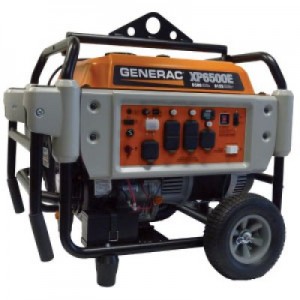Bringing a generator to your job site is a great way to ensure that you’re never left unable to work. Whether you need power in a remote location or need backup power in case the worst happens, a portable generator can get the job done by keeping the work going. At Maxwell Supply in Tulsa, we carry Generac generators because of their high quality and dependability. Before you buy your next generator, however, be sure to consider these options.
- Output
Rated and maximum output of a generator are important to know before making your purchase and knowing how much power you’ll need from your generator will help you narrow down your choices. Rated output refers simply to the number of watts the generator can produce for an indefinite amount of time. Maximum output is a little more vague. Many manufacturers treat this number of the most watts a generator can possibly produce, regardless of how long it’s able to sustain it. In the case of Generac generators, the maximum output refers to short bursts of power. For example, it may be able to start equipment with higher wattage than the rated output but it won’t be able to run for long at that output.
- Sizing
To determine the size of generator you’ll need, you need to first think about what it will be powering. Power tools complicate things because they typically need more power at start than they do while running. You’ll need to account for both scenarios and ensure your generator can handle them. A good rule of thumb is to purchase a generator large enough to run all your necessary tools at once while also starting your largest tool. Add 10-percent to that total and you shouldn’t have to worry about not having enough juice.
- Run time
The amount of power a generator can produce is important, but so too is how long the generator will run on a single tank of fuel. Of course, this will depend on how hard you work the generator. Most run time estimates will be based on the generator only working at half capacity. A generator with automatic idle control will be able to run at fewer RPMs when possible, which will save fuel and increase run time.
- Decibel rating
How loud your generator is while it’s running is also important. You’ll want to prevent hearing loss for yourself and your crew and you don’t want to disturb others in the community while you work. Prolonged exposure to anything over 85 decibels can result in hearing loss, so look for a generator that has a rating of no more than 75.
- Portability
A portable generator needs to be just that or it won’t be able to easily be transported from job site to job site. Those that include wheel kits are your best option because you’ll be able to easily load and unload and move them around the job. Without a wheel kit, you’re stuck trying to load a 250-pound piece of equipment in and out of a truck regularly. There are also models with lifting hooks that make it easy to hoist with forklifts and booms.
- Durability
Let’s be honest, you’re going to be hard on your equipment. You need a generator that isn’t going to break down every week. Look for wraparound metal frames that protect your generator. Most of these can withstand heavy impacts and keep going. Be sure to look into the scheduled maintenance and compare with the number of hours you’ll be on the job.
For more information about Generac generators, give us a call at 918-836-8606.
